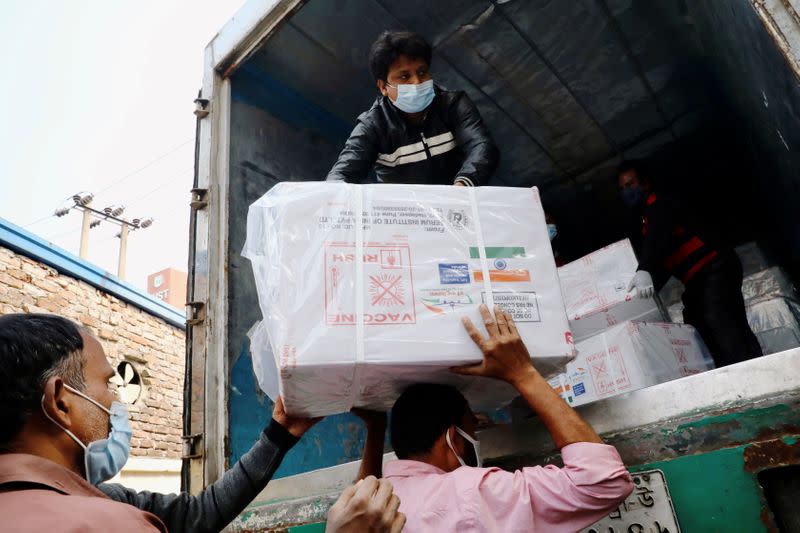By Sanjeev Miglani and Gopal Sharma
NEW DELHI / KATHMANDU (Reuters) – India will give millions of doses of the COVID-19 vaccine to countries in South Asia in the coming weeks, government sources said on Thursday, receiving praise from their neighbors and resisting China’s dominant presence in region.
Free shipments of the AstraZeneca vaccine manufactured by the Serum Institute of India, the world’s largest vaccine producer, have begun to reach the Maldives, Bhutan, Bangladesh and Nepal.
Myanmar and Seychelles are next in line for free shipments, while India uses its strength as one of the world’s largest manufacturers of generic drugs to build friendships.
“The government of India has shown goodwill in providing the vaccine granted. This is at the level of people, it is the public that is suffering the most from COVID-19,” said Nepal’s Minister of Health and Population, Hridayesh Tripathi.
The move comes at a time when India’s ties to Nepal were strained by a territorial dispute and Indian concern over the expansion of China’s political and economic influence in the Himalayan nation, squeezed among the Asian giants.
China, which had promised Nepal help to deal with the pandemic, is awaiting Nepal’s release for Sinopharm vaccines.
“We asked them to send more documents and information before we gave their approval,” said Santosh KC, a spokesman for Nepal’s drug administration department.
CHINESE RIVALITY
Bangladesh was supposed to receive 110,000 doses of free vaccine from Chinese company Sinovac Biotech, but Bangladesh refused to contribute to the cost of developing the vaccine, leading to the stalemate.
Instead, Bangladesh turned to India for urgent supplies and on Thursday was due to receive 2 million AstraZeneca vaccines as a gift from India.
“India is making the AstraZeneca vaccine that makes all the difference. It can be stored and transported at normal refrigerated temperatures and countries like Bangladesh have these facilities,” said a Bangladeshi health official.
Meanwhile, India’s arch-rival, Pakistan, on Thursday thanked China, its next strategic ally, for its promise to provide half a million doses of the vaccine free by the end of the month.
India has for years struggled to keep pace with Chinese investment in countries like Sri Lanka, Nepal and the Maldives, where China is building ports, roads and power plants as part of its Belt and Road initiative.
But the demand for vaccines in those countries, desperate to revive their tourism-dependent economies, offered Prime Minister Narendra Modi’s government a way to regain ground, diplomats say.
India is considering giving 12 million to 20 million vaccines to its neighbors in the first wave of assistance in the next three to four weeks, a government source said.
India is also helping to train health workers in some of these countries and install infrastructure to administer vaccines, the source said.
“It is a series of well-designed and calibrated actions that you are seeing, which confirm the validity of our ‘neighborhood first’ policy,” said a former Indian ambassador, Rajiv Bhatia.
“This increases our strengths in science and the pharmaceutical industry, and this is our time to shine.”
(Reporting by Sanjeev Miglani and Gopal Sharma in Kathmandu; Additional reporting by Ruma Paul in Dhaka and Umar Farooq in Islamabad; Editing by Robert Birsel and Gareth Jones)
